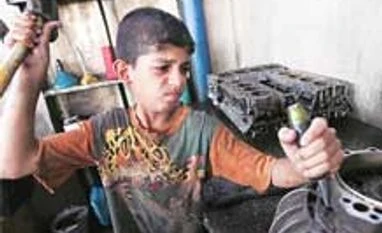The good work of Nobel laureate Kailash Satyarthi and other child rights crusaders could be undone by a proposed amendment to the law prohibiting employment of children, activists fear.
A report published in The Economic Times (‘Government to amend Child Labour Prohibition Act; new norms may allow below 14 to work in select setups’, April 27), says: “In a controversial labour reform, the government plans to push through an amendment to the Child Labour Prohibition Act in the current session of Parliament, which will allow children below the age of 14 to work in select family enterprises if it doesn’t hamper their education.”
The draft amendment has not yet been made available but the source for the article — a senior labour ministry official — informs that though the government plans to retain the proposal to ban employment of children aged below 14 years in all organisations, they would be allowed to help their families.
Picking on this “proposed” amendment, which is yet to be formally declared by the government, online media platform Scroll said in the headline of its May 1 article: “Government set to send millions of children back into exploitative labour.”
This is a fear that child rights activists also share.
Nishit Kumar, head, communications and strategic initiatives, CHILDLINE India Foundation, told Business Standard: “We understand from media reports that an amendment Bill could be introduced in Parliament in the winter session which would allow children under 14 years of age to work so long as they are helping the family in fields, forests and home-based work. This, if true, would be one of the most regressive steps.”
More From This Section
At present, children aged under 14 years are allowed to work only in “non-hazardous” sectors. This prohibits them from employment in mines, brick kilns or factories. An amendment Bill, introduced in the Rajya Sabha by the United Progressive Alliance government in 2013, had aimed to make all employment for children younger than 14 years illegal, and to allow those aged between 15 and 18 years to work in “non-hazardous” activities.
Nishit Kumar, however, looks at the proposed amendment with suspicion: “Family enterprise could mean anything.”
“The definition is so broad that all sectors that currently employ child labour — agriculture, agri-business, home and cottage sector and street businesses — will be covered. Even children of domestic workers and construction labourers could be allowed to work. Girl children would be taken out of schools and sent to work,” he said.
Experts, however, advocate a more cautious approach to the proposed amendment.
Rituparna Chakraborty, co-founder and senior vice-president, TeamLease, a leading employment portal, said: “I think we should wait and watch what the proposed Bill actually says rather than jumping to conclusions based on reports. This government has been very transparent; when the draft Bill is released, we should communicate anything we feel should be changed.”
She added some proposals of the previous amendment Bill, introduced in Parliament in 2013, were being obscured by the current debate. “The previous Bill proposed to make employment of all children below the age of 14 years illegal. This development is being obscured by the current discussion.”
Chakraborty said it would be impossible for the government to push through any “regressive” legislation in this era of transparency.
But activists are more worried about the “spirit” of the law than its nitty-gritty. Enakshi Ganguly, co-director, HAQ: Centre for Child Right, said: “How could we think of employment for children, in family enterprises or otherwise, when that directly violates the Right to Education?”
The Right to Education makes schooling free and compulsory for children aged below 14 years.
“The proposed amendment is a violation not only of the Right to Education but of the Right to Equality. How can children who work be expected to study with the same diligence as those who do not,” asked Ganguly.
On a comment reportedly by Labour Minister Bandaru Dattatreya that allowing children to work will cultivate “a spirit of enterprise” in them, Ganguly said: “As we know, family-based occupations align with the caste system. So what is the message we are sending out? Children should stick to their caste occupations?”
What message the government wishes to convey would of course be clear only once the draft Bill is made public.
)